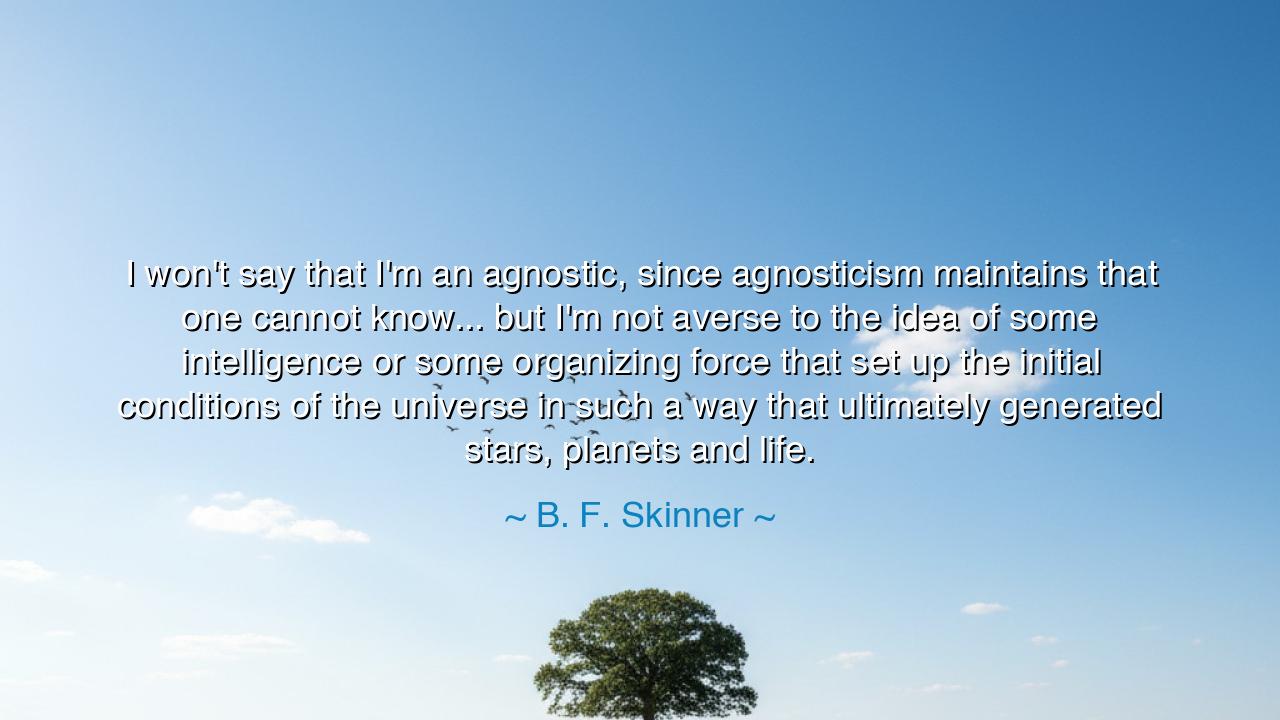
I won't say that I'm an agnostic, since agnosticism maintains
I won't say that I'm an agnostic, since agnosticism maintains that one cannot know... but I'm not averse to the idea of some intelligence or some organizing force that set up the initial conditions of the universe in such a way that ultimately generated stars, planets and life.






“I won't say that I'm an agnostic, since agnosticism maintains that one cannot know... but I'm not averse to the idea of some intelligence or some organizing force that set up the initial conditions of the universe in such a way that ultimately generated stars, planets and life.” Thus spoke B. F. Skinner, the great scholar of the mind, who sought to understand not only human behavior but the very structure of existence itself. In this confession lies the voice of a man who stands between reason and reverence, between the temple of science and the altar of mystery. He speaks not as a preacher, nor as a skeptic, but as one who sees in the harmony of the cosmos the faint trace of an organizing force, a pattern too vast to dismiss and too subtle to define.
In these words, Skinner does not claim faith, nor does he renounce it. He stands in the ancient lineage of those who gaze upon the stars and wonder what hand placed them there. The philosophers of old—Aristotle, Confucius, and even the mystics of the East—understood this same truth: that the universe moves not in chaos but in order, and that order implies purpose, even if the purpose is beyond the grasp of human speech. Skinner’s acknowledgment of a “force that set up the initial conditions” echoes the wisdom of those who saw divinity not in miracles, but in laws, in balance, in the unfolding rhythm of creation.
Let us look to the past for an example. Isaac Newton, master of the heavens, uncovered the invisible laws that bind the planets in their paths. Yet even he, when faced with the majesty of those laws, whispered of the Divine Clockmaker, the one who wound the mechanism and set it in motion. Though Newton was a man of logic, his heart could not deny the sacred elegance of the cosmos. Like Skinner centuries later, he saw that science and spirituality need not be enemies, but partners in the endless pursuit of truth. One reveals how things are; the other, why they are at all.
Skinner’s words also carry a warning: that certainty is a prison, and that humility before mystery is the mark of the wise. To say “I do not know” is not weakness—it is the first act of genuine knowledge. The ancients said that the gods conceal themselves not out of malice, but to teach mortals to seek. So too, the scientist who looks into the vastness of space or the philosopher who studies the labyrinth of the mind both encounter the same question: Is this vast dance an accident, or the unfolding of some hidden intention? Skinner leaves the question open, as all wise men must, for the universe reveals itself only to those who listen in wonder.
The organizing force of which Skinner speaks need not wear a human face, nor bear a sacred name. It may be what the Taoists called the Tao, the invisible current that shapes all being. It may be the ancient fire of Heraclitus, the divine motion that never ceases. It may be the cosmic intelligence that modern physicists glimpse in the fine-tuned harmony of existence. Whatever one calls it, it is that subtle flame of order that moves through chaos, the breath that turns dust into stars and stars into life. And in recognizing it, one does not abandon reason but completes it.
In this teaching there lies a profound peace. We are children of both matter and mystery. To live wisely, we must honor both. Let the mind inquire, let it measure, dissect, and calculate—but let the soul also kneel before the unknown, for there are truths that no equation can capture. The stars and the synapse, the atom and the thought, are all bound by one sacred thread. To feel this is not superstition; it is awakening.
Therefore, let your heart be both curious and humble. Study the world with clarity, but hold space for wonder. Do not rush to name the unseen, nor to deny it. Instead, live as one who participates in the great unfolding, aware that every breath, every act of kindness, every spark of thought is part of that organizing force which set the universe in motion. And when you gaze upon the night sky, remember the wisdom of Skinner: that even if we cannot know the Mind behind creation, we may still walk in reverence beneath its design—honest, intelligent, and filled with awe.






AAdministratorAdministrator
Welcome, honored guests. Please leave a comment, we will respond soon